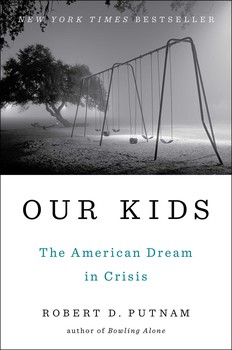Robert Putnam's Our Kids and Reclaiming the American Dream

Robert Putnam, in his seminal synthesis Bowling Alone, recalls the first two-thirds of the twentieth century when "a powerful tide bore Americans into ever deeper engagement in the life of their communities." In Our Kids, Putnam describes the 20th century boom that produced increases in both absolute and relative socio-economic mobility. The rich, the poor, and the middle class all benefited from the prosperity driven by industrial growth. The rising tide of the manufacturing economy raised all boats and, often, it raised the dinghies sailed by the poor more than the yachts.
Bowling Alone focused on the few decades preceding the 1990s when "silently, without warning -- that tide [toward deeper engagement in community life] reversed and we were overtaken by a treacherous rip current." Our Kids grounds the decline in social capital of America's poor in the decline of economic opportunity. It starts with Putnam's hometown in Ottawa County, Ohio where the industrial economy and economic mobility started to tremble and decline in the 1970s.
Bowling Alone focused on the few decades preceding the 1990s when "silently, without warning -- that tide [toward deeper engagement in community life] reversed and we were overtaken by a treacherous rip current." Our Kids grounds the decline in social capital of America's poor in the decline of economic opportunity. It starts with Putnam's hometown in Ottawa County, Ohio where the industrial economy and economic mobility started to tremble and decline in the 1970s.
Ottawa County illustrates the devastation wrought by deindustrialization throughout the nation. Good-paying jobs started to disappear in the 1970s and, by 2012, real wages were down by an average of 16%. This spurred a population decline and placed extreme stresses on families and communities. The rise of single parent families made it more difficult to prepare young children for the education necessary in the post-industrial, global economy, and schools were not able to address the Adverse Childhood Experiences (ACEs) endured by children during hard times.
Putnam recognizes that Bowling Alone could be read as a part of the "declensionist" tradition and he warns against interpreting his work as "simple nostalgia." He writes, "The fifties and sixties were hardly a 'golden age,' especially for those Americans who were marginalized because of their race or gender or social class or sexual orientation. Segregation, by race legally and by gender socially, was the norm, and intolerance, though declining, was still disturbingly high." But, he makes the case that the self-assurance that comes with a sense of belonging helped in the battle against racism, sexism, and intolerance.
Putnam observes:
Putnam observes:
We were a "can do" people, who accomplished whatever we set out to do. We had licked the Depression, turned the tide in World War II, and rebuilt Europe after the war. ... Freedom Summer was an audacious undertaking consistent with the exaggerated sense of importance and potency shared by the privileged members of America's postwar generation.
Moreover, Bowling Alone foreshadows a key theme in Our Kids by noting that "a well-connected individual in a poorly connected society is not as productive as a well-connected individual in a well-connected society." Putnam expands on this theme by documenting the divisive nature of the self-segregation of the last two decades.
One passage in Bowling Alone resonates for me because it recalled the special event when my elementary school principal took us to the junior high to watch a documentary. The real reason we need school, he added, was that in the future the work week would be 20 hours or less. We needed a great education so we could get the most out of new opportunities, be the most creative and fulfilled in our free time.
Putnam cites a 1958 University of Chicago study which "fretted that 'the most Robert Putnam's Our Kids and Reclaiming the American Dream | John Thompson:
